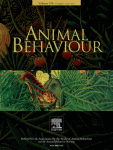Ver ítem
- xmlui.general.dspace_homeCentros Regionales y EEAsCentro Regional Entre RíosEEA ConcordiaArtículos científicosxmlui.ArtifactBrowser.ItemViewer.trail
- Inicio
- Centros Regionales y EEAs
- Centro Regional Entre Ríos
- EEA Concordia
- Artículos científicos
- Ver ítem
Resting ecology of parasitoids in the field: safe in a bed and breakfast?
Resumen
The selection of a safe place to rest at night may be an essential survival strategy for diurnal animals. Despite the importance of parasitoid wasps as consumers in terrestrial ecosystems, their selection of sites to rest and their mortality during the night have not been measured, to the best of our knowledge, reflective of a general lack of understanding of resting behaviours of insects in the field. Here, we used parasitoid wasps of the genus Aphytis
[ver mas...]
The selection of a safe place to rest at night may be an essential survival strategy for diurnal animals. Despite the importance of parasitoid wasps as consumers in terrestrial ecosystems, their selection of sites to rest and their mortality during the night have not been measured, to the best of our knowledge, reflective of a general lack of understanding of resting behaviours of insects in the field. Here, we used parasitoid wasps of the genus Aphytis (Hymenoptera: Aphelinidae), the highly successful biological control agents of the California red scale, Aonidiella aurantii (Hemiptera: Diaspididae), to study the resting ecology of parasitoids in the field over space and time, considering both external and internal correlates of parasitoid resting behaviour. At night, Aphytis wasps tended to rest on citrus tree leaves, which have a lower host density, but also fewer predators and a greater density of food sources for adult wasps, compared to fruit and branches. On this plant substrate, most of the population avoided predators and survived the night. Aphytis wasps selected leaves on which to rest at night in a nonrandom fashion. They tended to aggregate on leaves with high densities of hosts and food sources (honeydew) and with low densities of potential predators. During the day, wasps with lower egg loads tended to remain on leaves, likely resting and maturing eggs. Overall, our results demonstrate, for the first time, that parasitoids select certain sites at which to rest safely at night. These findings also suggest that the availability of safe resting places could be a valuable resource for beneficial insects in agroecosystems, especially those that have life spans extending over multiple days.
[Cerrar]

Autor
Tena, Alejandro;
Bouvet, Juan Pedro;
Abram, Paul K.;
Fuente
Animal Behaviour 190 : 11-21. (August 2022)
Fecha
2022-08
Editorial
Elsevier
ISSN
0003-3472
Formato
pdf
Tipo de documento
artículo
Palabras Claves
Derechos de acceso
Restringido
 Excepto donde se diga explicitamente, este item se publica bajo la siguiente descripción: Creative Commons Attribution-NonCommercial-ShareAlike 2.5 Unported (CC BY-NC-SA 2.5)
Excepto donde se diga explicitamente, este item se publica bajo la siguiente descripción: Creative Commons Attribution-NonCommercial-ShareAlike 2.5 Unported (CC BY-NC-SA 2.5)

